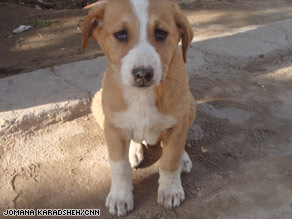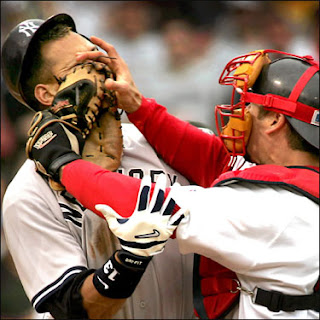Lincoln Video




In numismatic news, be on the lookout for the four new pennies being put into circulation today.
This Blog has been specifically created for Mr. MacArthur's ComMedia Class at Tolland High School for the Spring Semester, 2006. We will be following the big stories of the next few months and how they're covered (or not covered) in the media (MsM and Alt!).
A child of the 60's, graduate of Tolland High School, the University of Connecticut, and Wesleyan University, ready to begin his 34th year teaching -- all at Tolland High.




 A Miss Tori Simmons of Tolland, Connecticut, alerts us to this next story -- her upcoming AMS report. It comes with a viewer discretion warning, so if you're a real animal lover, please be advised.
A Miss Tori Simmons of Tolland, Connecticut, alerts us to this next story -- her upcoming AMS report. It comes with a viewer discretion warning, so if you're a real animal lover, please be advised.I do remember getting several calls from day-care directors or school nurses to inform me that although my child seemed happy and active, there was in fact a lurking fever — and I remember biting back the question, what kind of zealot takes the temperature of a happy, active child?But what about having to sit in a class next to Typhoid Mary? Shouldn't we make them stay home?
But of course, they were worrying about the other children. And that is a fair question with any child who is borderline sick: who is infectious, what’s the risk, and is there anything we can do to reduce it?
Doctors, as a group, are big believers in sending children to school. Every doctor I’ve talked to is more concerned about children unnecessarily missing school than about their posing an infection risk to their classmates.
Children with viral infections can be infectious before they show symptoms, as well as after their symptoms clear up. On the other hand, some children with R.S.V. can cough for weeks, not because there are still viral particles but because the virus has affected the lining of their lungs.So what can we do to keep from getting sick. What my wife, an infection control practioner, has for years been telling everyone who will listen:
So you can have an asymptomatic child who is shedding virus, a coughing child who is no longer shedding virus, and infection by viral particles that lurk on surfaces and objects. “It’s not practical to keep everybody out who’s shedding virus — that’s everybody all winter long,” said Dr. Robert Tolan, chief of the division of allergy, immunology and infectious diseases at the Children’s Hospital at St. Peter’s University Hospital in New Brunswick, N.J.
“The only thing we can really show well in infection control is hand washing,” Dr. Hall said. “Even for those viruses that are spread by aerosol” — through the air.

So why did Obama refuse to answer? Simple. Because if he did, the media would have reported it as a gaffe. Reporters either know nothing about the Middle East or, for the most part, have adopted Israel's perspective.That struck me as peculiar, to say the least. If any of you were following the recent conflict in the Gaza strip, you'd know that the Israelis, ostensibly to protect themselves from rockets being fired into their territory by the terrorist organizastion Hamas, killed over a thousand Gazans (approximately half of them civilians. Hamas uses the tactic of firing from civilain areas: if you want to strike back at them, you risk killing innocent people. Hamas is counting on their enemies being more humane than they are -- or the publicity backlash that will come along with the pictures of dead children that will inevitably result).
Had Obama spoken the truth, the media would have made his "blunder" the story of the night.
He cannot afford that because, frankly, we have more important things to worry about, like rescuing the economy.
So I don't fault Obama. But I salute Helen Thomas. Next time she should ask how he felt about those pictures that came out of Gaza. As the father of those two precious girls, we all know how he felt. But it would help America in the eyes of the world if he'd just say it.
Tonight, President Obama demonstrated avoidance, not leadership, regarding this pivotal issue. He is far to[o] worldly not to have done so intentionally, which, while frustrating, also provides concerned citizens with a concrete goal: the task of driving him to greater candor -- and with it, better policy -- in the future.In this Obama is like me driving down the highway on a snowy day: half the people think he's driving too fast, and the other half think he's driving too slow.
 Well, it's a sad day for baseball in general, and the Yankees in particular. Alex Rodriguez, (known as A-Fraud to his teammates), has been revealed by Sports Illustrated as having tested positive for the steroid Primobolan. (So did 103 other currrent and former big leaguers, but A-Rod's was the only named leaked to the press.
Well, it's a sad day for baseball in general, and the Yankees in particular. Alex Rodriguez, (known as A-Fraud to his teammates), has been revealed by Sports Illustrated as having tested positive for the steroid Primobolan. (So did 103 other currrent and former big leaguers, but A-Rod's was the only named leaked to the press.
 This could probably merit an AMS all on its own. We'll be hearing and seeing a lot of Governor Palin over the next four years. Personally, I think she should get out of politics and get a talk show -- she definitely has a certain flair and charisma. Love or or hate her, people will watch her.
This could probably merit an AMS all on its own. We'll be hearing and seeing a lot of Governor Palin over the next four years. Personally, I think she should get out of politics and get a talk show -- she definitely has a certain flair and charisma. Love or or hate her, people will watch her.
 The story broke in the British tabloid, News of the World. Apparently they broke all their previous records for page views. (If you are going to click on this link, be careful. The News of the World puts the oy! in tabloid.)
The story broke in the British tabloid, News of the World. Apparently they broke all their previous records for page views. (If you are going to click on this link, be careful. The News of the World puts the oy! in tabloid.)The story was then picked up by the MsM (the main stream media); for instance, the Washington Post. Readers posting comments to the story generally believed that what Phelps did was not so awful, although many did feel that Phelps was failing to live up to his role-model status.
Forbes, a reputable business magazine, believed that the incident would not do a great deal of harm to Phelps's marketing possibilities (while noting that he had not been too successful in that arena, anyway.
Phelps will, no doubt, be subject of many jokes and much ridicule, such as this column in the San Jose (California) Mercury-News.
From the MoJo Blog: Army Suicides Reach Historic High
They are citing an AP article:
WASHINGTON (AP) — Stressed by war and long overseas tours, U.S. soldiers killed themselves last year at the highest rate on record, the toll rising for a fourth straight year and even surpassing the suicide rate among comparable civilians. Army leaders said they were doing everything they could think of to curb the deaths and appealed for more mental health professionals to join and help out.
At least 128 soldiers committed suicide in 2008, the Army said Thursday. And the final count is likely to be even higher because 15 more suspicious deaths are still being investigated.
Now, MoJo stands for Mother Jones, which is a left-of-center magazine. (The original Mother Jones was a labor organizer.) So ask yourself, what is the point of this article. Is it pro-soldier? Or anti-war? Or both?
Here's an article from the Associated Press. Strictly reporting; "Just the facts, m'am."
One of Sarkozy's solutions to help the industry is a pilot program that will give teenagers celebrating their 18th birthday a free, yearlong subscription to any general news daily of their choice. The publisher is to give the newspapers away, while the state pays for the deliveries.
That initiative appeared designed to assuage industry fears that young readers don't share the same appetite for print media that their parents and grandparents have, denting current and future revenues.
"The habit of reading the press is learned very young," Sarkozy said.
Sounds like a good idea to me. I never read a newspaper seriously (outside Sports and Funnies) until I was in college, when the Red Chinese leader Mao zeDong died. At the same time there was social unrest in Mexico, so I thought "I should pick up a newspaper." I got myself a copy of The New York Times, and I've been reading it ever since.
But Cory Doctorow, writing for a blog called Boing-Boing, is a lot more skeptical.
The latest weird-ass move from French President Sarkozy is to bail out newspapers by giving kids free daily newspaper subscriptions on their 18th birthdays, which is supposed to instill "the habit of reading the press." I wonder if he'll also give out free bridle and tackle to instill "the habit of dressage." How about stimulating the French press by giving all the kids free, uncensored broadband?
He thinks that nothing will make you young people read, and that newspapers are on their way out!